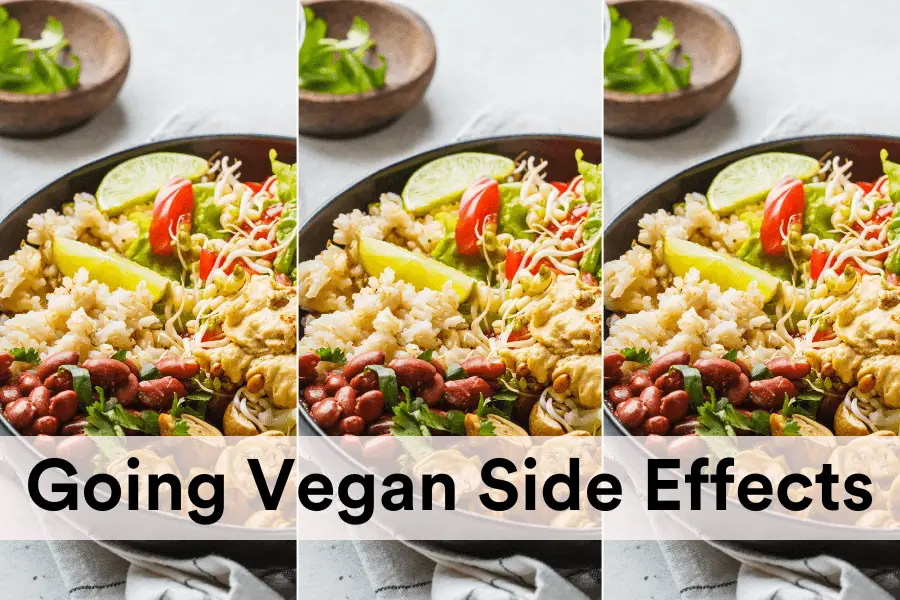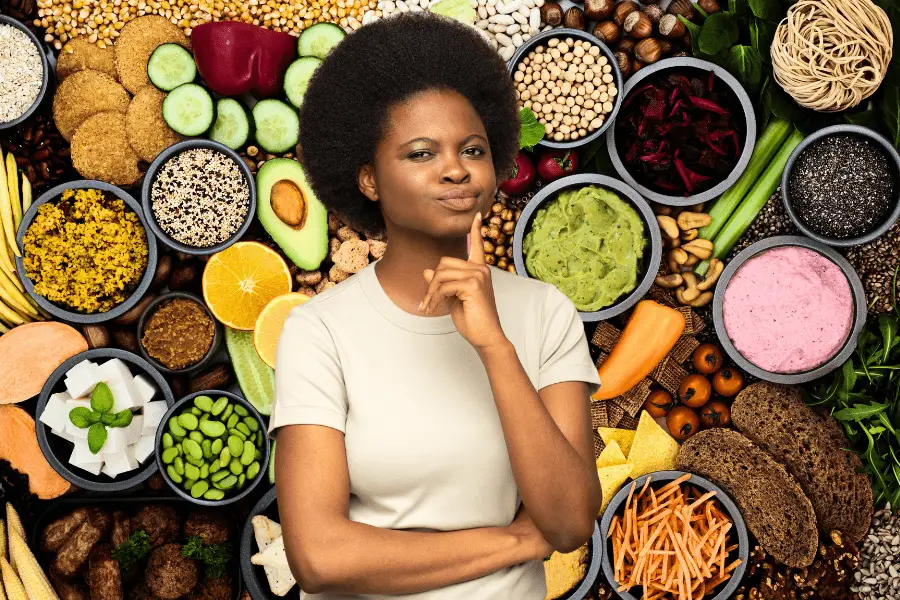In my journey towards veganism, I was faced with several side effects that I didn’t imagine I would meet. This made me question my decision to go vegan.. I kept on wondering for a time if I was taking the right step. But when I took the time to understand the benefits and challenges of going vegan, I was better able to navigate this huge lifestyle change with more confidence. As someone who is passionate about health and wellness,
I believe it is important to address the concerns and misconceptions that surround veganism. In this post, we’ll discuss the going vegan side effects and how to overcome them. We will also talk about how to maximize the numerous benefits of this plant-based lifestyle.

.
This post is all about going vegan side effects, what to expect and how to thrive
Table of Contents
What Is Veganism?

Before delving into the going vegan side effects, let’s clarify what veganism entails. Veganism is a lifestyle that excludes all forms of animal exploitation and cruelty, including in diet, clothing, and other areas. People choose veganism for various reasons, such as ethical, environmental, and health concerns. A vegan diet primarily consists of plant-based foods, such as fruits, vegetables, grains, legumes, nuts, and seeds. By eliminating animal products like meat, dairy, eggs, and honey, vegans aim to lead a more compassionate and sustainable life.
Related Post: MEET THE TOP 5 INSPIRING BLACK VEGAN NUTRITIONISTS SHAPING THE FUTURE OF HEALTH

Benefits of Veganism
Embracing a vegan lifestyle can offer a multitude of benefits for your health, the environment, and animal welfare. Research suggests that a plant-based diet rich in fruits and vegetables can lower the risk of chronic diseases like heart disease, diabetes, and certain cancers. Additionally, veganism can reduce your carbon footprint and help combat climate change by minimizing the environmental impact of animal agriculture. By choosing cruelty-free alternatives, vegans advocate for the ethical treatment of animals and promote a more compassionate world for all beings.
Pros and Cons of Being Vegan

Like any dietary choice, being vegan comes with its own set of pros and cons. Some of the advantages of veganism include improved heart health, weight management, and reduced inflammation. Moreover, plant-based diets tend to be rich in essential nutrients like fiber, vitamins, and antioxidants, which support overall well-being. On the flip side, transitioning to a vegan diet may require careful planning to ensure you meet your nutritional needs, especially for nutrients like vitamin B12, iron, and omega-3 fatty acids. It is essential to educate yourself on plant-based sources of these nutrients and consider supplements if necessary to prevent deficiencies.
Is Being Vegan Healthier Than Eating Meat?
The debate over whether a vegan diet is healthier than a diet that includes meat is ongoing. While plant-based diets have been linked to numerous health benefits, including weight loss and lower risk of chronic diseases, it ultimately depends on the overall quality of your food choices. A vegan diet high in processed foods and lacking in essential nutrients may not be healthier than a balanced omnivorous diet. However, focusing on whole, nutrient-dense plant foods can provide you with all the essential nutrients you need for optimal health. It’s essential to prioritize variety, balance, and moderation in your vegan diet to reap its full health benefits.
What Happens to Your Body When You First Go Vegan?

When you first transition to a vegan diet, your body may undergo certain changes as it adapts to a plant-based eating pattern. Some common side effects during the initial stages of going vegan include increased gas and bloating due to higher fiber intake, changes in bowel movements as your gut microbiome adjusts, and potential weight fluctuations as you navigate new food choices. These side effects are often temporary and can be mitigated by gradually introducing more plant-based foods into your diet, staying hydrated, and focusing on whole, minimally processed foods.
Are There Any Risks to Being Vegan?
While veganism can offer numerous health benefits, there are potential risks if you do not plan your diet thoughtfully. Some challenges of being vegan include the risk of nutrient deficiencies like vitamin B12, iron, calcium, and omega-3 fatty acids, which are primarily found in animal products. To mitigate these risks, it is crucial to educate yourself on plant-based sources of these nutrients, consider fortified foods or supplements, and consult a healthcare provider or registered dietitian for personalized guidance. With proper planning and awareness, you can thrive on a vegan diet while minimizing potential health risks.
Are Vegans Healthier?
Research suggests that well-planned vegan diets can be just as healthy, if not healthier, than omnivorous diets when it comes to preventing chronic diseases and promoting overall wellness. By emphasizing whole, plant-based foods and avoiding processed and heavily refined products, vegans can enjoy a diet rich in fiber, antioxidants, and essential nutrients. Additionally, plant-based diets are associated with a lower risk of obesity, high blood pressure, and certain cancers. However, individual health outcomes vary based on factors like food choices, lifestyle habits, and genetic predispositions. It’s essential to focus on a balanced, varied vegan diet to support optimal health outcomes.

In this post, we’ve talked about the going vegan side effects, the benefits, and how to thrive on a plant-based diet while addressing potential challenges. We have highlighted the importance of the following points:
- Educating Yourself: Learn about vegan nutrition to ensure you’re getting all the essential nutrients your body needs. Understand which plant-based foods are rich in protein, iron, calcium, vitamin B12, and other nutrients. Websites, books, and documentaries can provide valuable information.
- Gradual Transition: Instead of going vegan overnight, consider gradually phasing out animal products from your diet. Start by incorporating more plant-based meals into your routine and slowly eliminating animal products. This approach allows your taste buds and digestion to adapt gradually.
- Experimenting with Recipes: Explore vegan cooking by trying out new recipes and experimenting with different ingredients. Get creative in the kitchen to discover delicious plant-based alternatives to your favorite dishes. There are countless vegan blogs, cookbooks, and YouTube channels offering inspiration and guidance.
- Seeking Support: Connect with other vegans for support and guidance, whether it’s through online communities, local meetups, or social media groups. Surrounding yourself with like-minded individuals can provide encouragement, recipe ideas, and practical advice for navigating social situations and dining out.
- Being Kind to Yourself: Embracing a vegan lifestyle is a journey, and it’s okay to slip up occasionally or face challenges along the way. Remember that every small step you take toward reducing animal products has a positive impact on your health, the environment, and animal welfare. Be patient with yourself and celebrate your progress, no matter how small.
By understanding the impacts of veganism on your health, the environment, and animal welfare, you can make informed choices that align with your values and promote overall well-being. Whether you’re considering going vegan or looking to enhance your existing plant-based diet, remember that education, preparation, and mindfulness are key to a successful and fulfilling vegan lifestyle.

This post was all about “Going Vegan Side Effects”
Read Next: THE MUST-HAVE BLACK VEGAN COOKBOOK FOR EVERY KITCHEN: OUR TOP 7 PICKS
